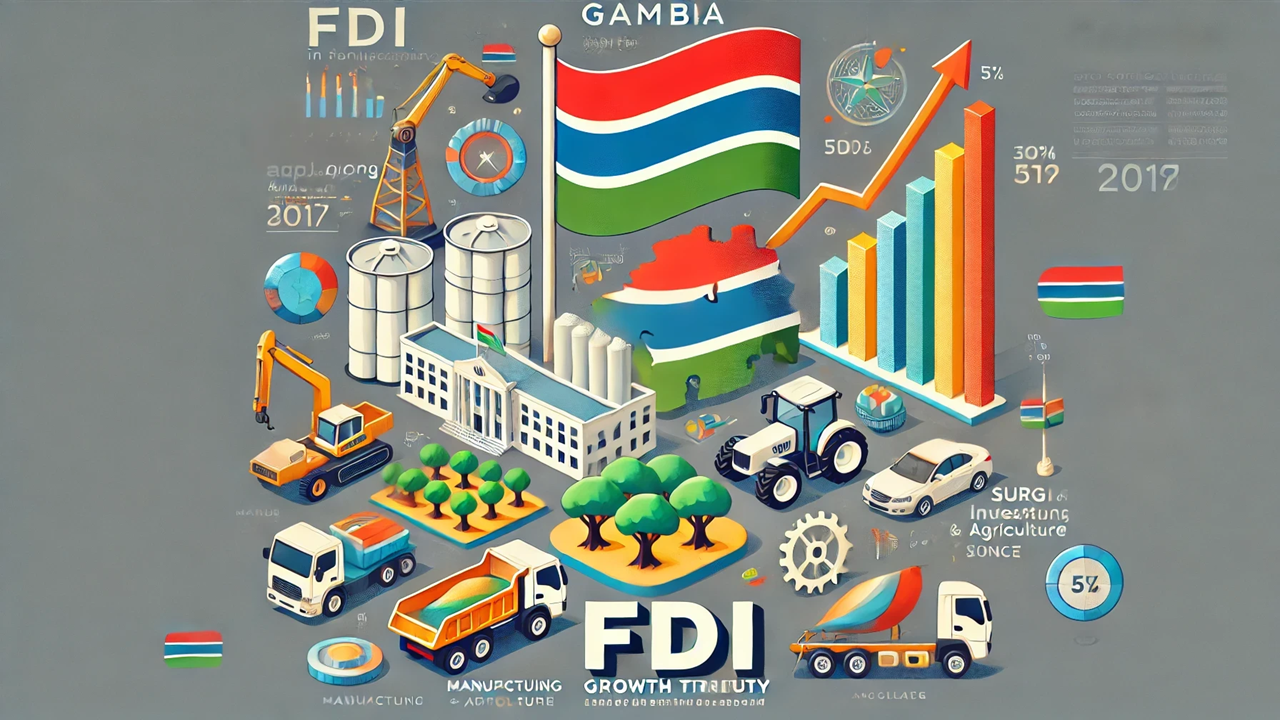Gambia's Economic Transformation: Unleashing a New Era of Investment
The Gambia has experienced a significant surge in FDI since 2017, driven by strategic reforms and enhanced investor confidence. The UNCTAD report highlights the progress made and identifies areas for further improvement to sustain this growth trajectory.

The Gambia has been making headlines with its impressive surge in Foreign Direct Investment (FDI) since the implementation of the Investment Policy Review (IPR) in 2017. This upward trajectory has positioned the country as a beacon of investment in West Africa. The United Nations Conference on Trade and Development (UNCTAD) recently published a report analyzing the progress of these initiatives, highlighting significant improvements while also pointing out areas that need further attention.
A Surge in Foreign Direct Investment
The Gambian investment landscape has transformed dramatically since 2017. FDI inflows have skyrocketed, rising from a modest $18 million to an astonishing $249 million in 2021. This nearly 14-fold increase is attributed to growing investor interest in diverse sectors such as manufacturing, agriculture, and real estate. The momentum continued in 2022, with FDI levels remaining robust at $236 million. This surge is not just about numbers; it signifies a burgeoning confidence in The Gambia's economic potential.
Sectoral and Geographic Diversification
The investment boom has been widespread across various sectors. The issuance of Special Investment Certificates (SIC) to non-Gambians tripled between 2021 and 2023 compared to the 2014–2016 period. Manufacturing and agriculture have been the top beneficiaries, attracting significant investments. Additionally, The Gambia has advanced its energy exploration efforts through partnerships with global oil, gas, and hydrogen companies, drawing investors from diverse regions including Germany, India, Lebanon, and the United States.
Key Reforms and Legislative Changes
The Gambian government has undertaken several reforms to enhance the investment climate. Key legislative changes include clarifying regulations under the Gambia Investment and Export Promotion Agency (GIEPA) Act and introducing a new Labour Act. These reforms aim to provide clearer guidelines on investment, export, and administrative procedures, thereby fostering a more predictable and investor-friendly environment.
The adoption of regional investment agreements like the ECOWAS Common Investment Code and the ratification of the African Continental Free Trade Area (AfCFTA) agreement have further strengthened The Gambia's position as an attractive investment destination. These agreements enhance regional integration and market access, providing Gambian businesses with new opportunities to expand their reach.
Challenges and Areas for Improvement
Despite the significant progress, The Gambia still faces challenges that could hinder its investment potential. One major area of concern is the need for further clarification and reform of investment legislation. The conditions for government intervention in strategic industries and the lack of clarity around expropriation conditions are some of the issues that need to be addressed.
Land management remains a critical hurdle, with complex land regimes and lengthy title registration processes posing significant obstacles. Additionally, the tax regime requires streamlining to reduce the fiscal burden on sectors like ICT, which is crucial for the country's digital transformation.
Investment promotion efforts need to be more targeted and strategic. While the establishment of a new website and Client Relationship Management software has improved image-building and aftercare services, more proactive investment targeting is necessary to attract high-impact investments.
Moving Forward: Recommendations for Sustainable Growth
To build on the progress made and achieve the ambitious goals set in the 2023–2027 Recovery-Focused National Development Plan, several recommendations have been proposed. Firstly, clarifying the GIEPA Act and aligning it with international best practices is essential. This includes removing discriminatory elements and ensuring a level playing field for both domestic and foreign investors.
Reforming investment treaties to incorporate sustainable development principles is also crucial. This will ensure that investments contribute positively to the country's long-term growth and align with global sustainability goals.
Enhancing the use of e-government tools can significantly improve governance and reduce opportunities for corruption. The planned implementation of the Integrated Tax Administration System (ITAS) is a step in the right direction, and efforts should be made to support the private sector in utilizing these tools effectively.
Strengthening the capacity of regulatory bodies and improving competition and consumer protection frameworks are also critical. Addressing supply-side constraints and enhancing export capacity will enable Gambian businesses to compete more effectively in international markets.
Finally, reinforcing investment promotion efforts through better resource allocation and proactive strategies will help attract high-quality investments. Regularly updating the GIEPA's online presence and fostering relationships with diplomatic representations can enhance the country's investment appeal.
The Gambia has made remarkable strides in improving its investment climate, attracting unprecedented levels of FDI, and implementing key reforms. However, to fully realize its potential and achieve sustainable growth, further measures are needed. By addressing the remaining challenges and implementing the recommended actions, The Gambia can continue to build a robust and inclusive economy that benefits all its citizens.
- FIRST PUBLISHED IN:
- Devdiscourse










